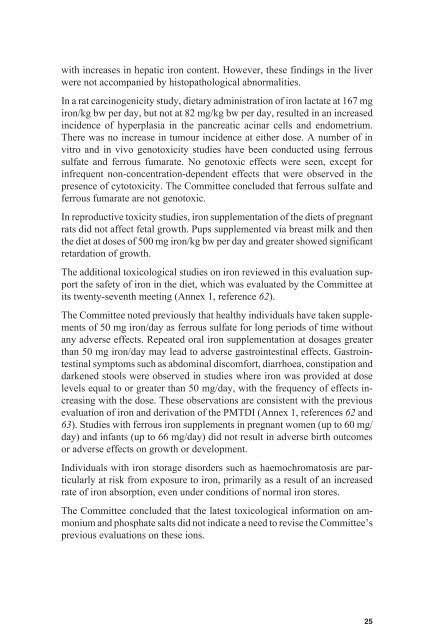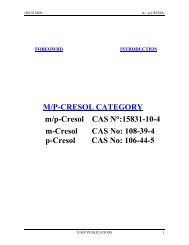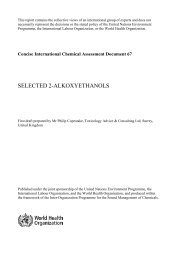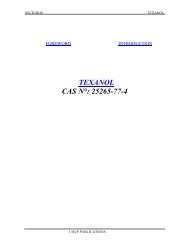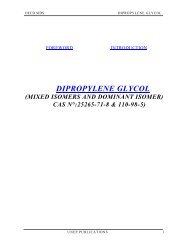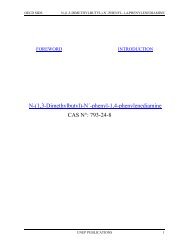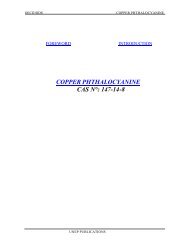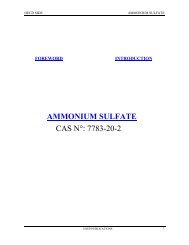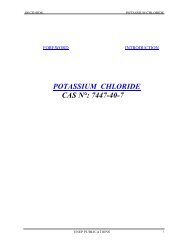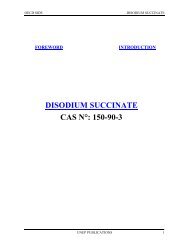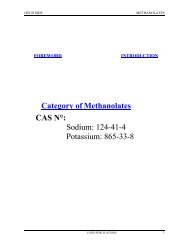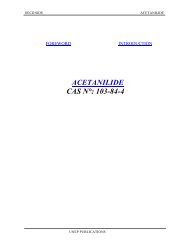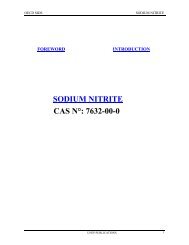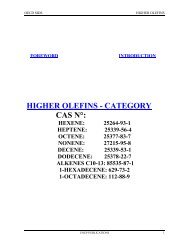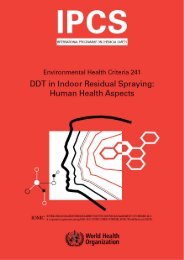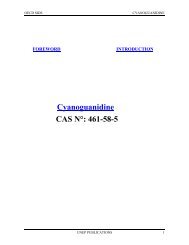evaluation of certain food additives - libdoc.who.int - World Health ...
evaluation of certain food additives - libdoc.who.int - World Health ...
evaluation of certain food additives - libdoc.who.int - World Health ...
Create successful ePaper yourself
Turn your PDF publications into a flip-book with our unique Google optimized e-Paper software.
with increases in hepatic iron content. However, these findings in the liver<br />
were not accompanied by histopathological abnormalities.<br />
In a rat carcinogenicity study, dietary administration <strong>of</strong> iron lactate at 167 mg<br />
iron/kg bw per day, but not at 82 mg/kg bw per day, resulted in an increased<br />
incidence <strong>of</strong> hyperplasia in the pancreatic acinar cells and endometrium.<br />
There was no increase in tumour incidence at either dose. A number <strong>of</strong> in<br />
vitro and in vivo genotoxicity studies have been conducted using ferrous<br />
sulfate and ferrous fumarate. No genotoxic effects were seen, except for<br />
infrequent non-concentration-dependent effects that were observed in the<br />
presence <strong>of</strong> cytotoxicity. The Committee concluded that ferrous sulfate and<br />
ferrous fumarate are not genotoxic.<br />
In reproductive toxicity studies, iron supplementation <strong>of</strong> the diets <strong>of</strong> pregnant<br />
rats did not affect fetal growth. Pups supplemented via breast milk and then<br />
the diet at doses <strong>of</strong> 500 mg iron/kg bw per day and greater showed significant<br />
retardation <strong>of</strong> growth.<br />
The additional toxicological studies on iron reviewed in this <strong>evaluation</strong> support<br />
the safety <strong>of</strong> iron in the diet, which was evaluated by the Committee at<br />
its twenty-seventh meeting (Annex 1, reference 62).<br />
The Committee noted previously that healthy individuals have taken supplements<br />
<strong>of</strong> 50 mg iron/day as ferrous sulfate for long periods <strong>of</strong> time without<br />
any adverse effects. Repeated oral iron supplementation at dosages greater<br />
than 50 mg iron/day may lead to adverse gastro<strong>int</strong>estinal effects. Gastro<strong>int</strong>estinal<br />
symptoms such as abdominal discomfort, diarrhoea, constipation and<br />
darkened stools were observed in studies where iron was provided at dose<br />
levels equal to or greater than 50 mg/day, with the frequency <strong>of</strong> effects increasing<br />
with the dose. These observations are consistent with the previous<br />
<strong>evaluation</strong> <strong>of</strong> iron and derivation <strong>of</strong> the PMTDI (Annex 1, references 62 and<br />
63). Studies with ferrous iron supplements in pregnant women (up to 60 mg/<br />
day) and infants (up to 66 mg/day) did not result in adverse birth outcomes<br />
or adverse effects on growth or development.<br />
Individuals with iron storage disorders such as haemochromatosis are particularly<br />
at risk from exposure to iron, primarily as a result <strong>of</strong> an increased<br />
rate <strong>of</strong> iron absorption, even under conditions <strong>of</strong> normal iron stores.<br />
The Committee concluded that the latest toxicological information on ammonium<br />
and phosphate salts did not indicate a need to revise the Committee’s<br />
previous <strong>evaluation</strong>s on these ions.<br />
25


